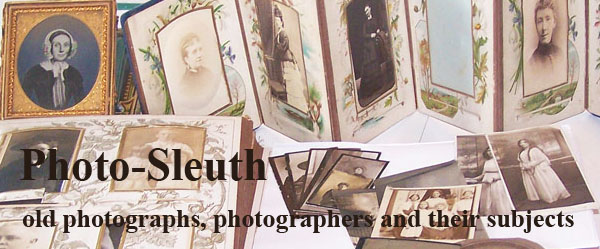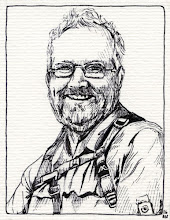
This rather battered postcard shows my grandfather's younger brother, Harold Victor Payne (1898-1921), seated in the centre of the front row in a uniform, perhaps supposed to be that of a policeman or soldier. Five other men are also in costume, two as clowns, and the three standing at the back wearing a tam-o-shanter, top hat and glengarry cap, from left to right. It can be identified as a studio portrait by the fact that a painted backdrop has been used, although there is no photographer identified - the reverse is a standard, generic printed postcard.
Harold Victor was born and grew up in New Normanton, where his parents Charles Vincent and Amy Payne had around 1903 moved into a house built by his grandfather Henry Payne at 139 St James' Road, known as "The Hollies." This photograph appears to have been taken when he was about 18 or 19, and therefore c. 1916-1917. I assume that he would have enlisted in the British Army soon after he had turned eighteen, as were all able-bodied young men. Unfortunately, his service records appear not to have survived.

I have another postcard photo of him taken at Derby by E.M. Treble, in which he is dressed in a civilian suit, and which is inscribed on the reverse "HV Payne July 1918." Presumably, since he was already twenty years old by then, he was home on leave from the army.

Perhaps it was taken shortly before he departed for France, where he served with the Tank Corps? The medal card shown above gives his name, regimental number, rank, unit, and the medals to which he was entitled (Source: British Army WWI Medal Rolls Index Cards, 1914-1920, from Ancestry; Original data from the Army Medal Office, in the care of The Western Front Association).

The image shown above is of a postcard from Harold addressed to his mother, dated 22 November 1919, and obviously sent when he was in Cologne awaiting demobilization. Also written on the reverse is "Pte H Payne 315778 B.A.O.R." The B.A.O.R. is an acronym for British Army of the Rhine, which occupied Germany after the Great War. Harold is again seated in the middle of the front row, having a cigarette lit for him. Members of the Great War Forum have identified the clothing as "hospital blues," which indicates that the group were all convalescing at the time.

Indeed, another photograph (shown above), presumably from the same sequence, shows Harold, this time seated on the left, indoors with two friends, one of whom has his head bandaged.


Andre Hallam has again done an excellent job of colourising the postcards which have featured in this article, producing two most evocative group portraits. We have gone to some effort to ensure that the colours used are as close as possible to the original colours of the uniforms and hospital clothing of the time. I am very grateful to various members of The Great War Forum (Mike Morrison, Grant, Jon & Peter) for their assistance. If you are interested in how we got there, visit this forum thread, although I should point out that you will have to register on the site to be able to see the images.








No comments:
Post a Comment